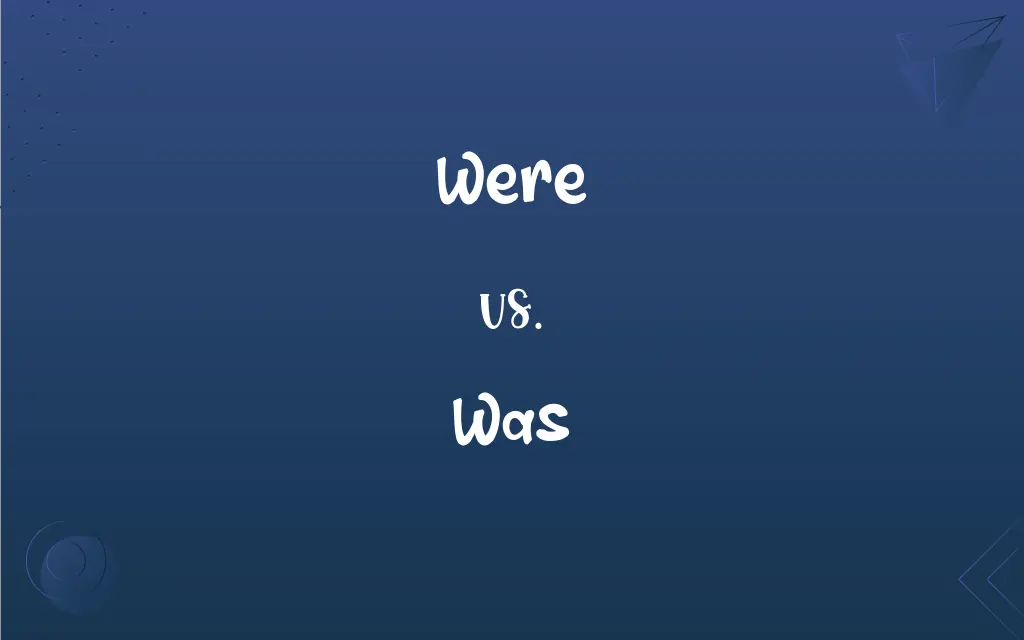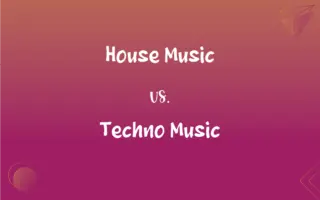Were vs. Was: What's the Difference?
Edited by Harlon Moss || By Janet White || Published on February 22, 2024
"Were" is the past tense plural form of "be," used for multiple subjects, whereas "was" is the past tense singular form, used for singular or non-specific subjects.

Key Differences
"Were" is used in sentences where the subject is plural or in the second person (you), indicating a past state or action. For example, "They were happy." In contrast, "was" is used with singular third-person subjects, as in "He was late."
In the subjunctive mood, used for hypotheticals or wishes, "were" is applied regardless of the subject number, such as in "If I were a bird." "Was," however, does not typically appear in the subjunctive mood.
"Were" can also be used in questions when addressing plural subjects, like "Were you at the party?" On the other hand, "was" is used in questions with singular subjects, as in "Was she there?"
In past continuous tense, "were" is combined with verbs ending in -ing for plural subjects ("They were running"). "Was" is used similarly but with singular subjects ("She was singing").
"Were" is commonly seen in conditional sentences for unreal or hypothetical situations, like "If they were older, they could drive." Conversely, "was" appears in indicative past tense statements, such as "It was cold yesterday."
ADVERTISEMENT
Comparison Chart
Subject Agreement
Plural and second person (you)
Singular third person and non-specific subjects
Use in Subjunctive Mood
Common (e.g., "If I were")
Rare
Question Form
Used with plural subjects (e.g., "Were they?")
Used with singular subjects (e.g., "Was he?")
Past Continuous Tense
With plural subjects (e.g., "They were playing")
With singular subjects (e.g., "He was playing")
Conditional Sentences
Often used in unreal conditions (e.g., "If we were")
Used in indicative past tense (e.g., "It was sunny")
ADVERTISEMENT
Were and Was Definitions
Were
Used in subjunctive mood for hypotheticals.
If I were in charge, things would be different.
Was
Used in questions with singular third-person subjects.
Was the cat outside?
Were
Past tense of "be" for plural subjects.
They were excited about the trip.
Was
To describe a past state or condition.
It was a sunny day.
Were
Used in questions with "you," "we," and "they."
Were you at the store earlier?
Was
Past tense of "be" for singular subjects.
He was late to the meeting.
Were
For forming past continuous tense with plural subjects.
We were watching a movie when you called.
Was
For forming past continuous tense with singular subjects.
She was reading a book all night.
Were
For conditional sentences with plural or second person subjects.
If you were taller, you could reach the shelf.
Was
For singular subjects in past narrative.
The machine was obsolete but still functioning.
Were
Second person singular and plural and first and third person plural past indicative of be.
Was
First and third person singular past indicative of be. See Note at you-uns.
Were
Past subjunctive of be. See Usage Notes at if, wish.
Was
Inflection of be.
I was castigated and scorned.
Was
Inflection of be.
It was a really humongous slice of cake.
Was
Used in phrases with existential there when the semantic subject is (usually third-person) plural.
There was three of them there.
Was
Inflection of be.
Was
Inflection of be
Was
Inflection of be
Was
The first and third persons singular of the verb be, in the indicative mood, preterit (imperfect) tense; as, I was; he was.
FAQs
Is 'was' used for singular or plural subjects?
'Was' is used for singular subjects and in a non-specific context.
What is the subjunctive mood with 'was'?
'Was' is rarely used in the subjunctive mood; 'were' is preferred.
When do I use 'were'?
Use 'were' with plural subjects and in the second person singular or plural (you).
Can 'were' be used in singular form?
Yes, in the subjunctive mood, like in "If I were."
How do I form a question with 'were'?
Use 'were' for plural subjects, like "Were they ready?"
Can 'were' be used in past continuous tense?
Yes, with plural subjects, e.g., "They were walking."
Is 'was' correct in past continuous tense?
Yes, for singular subjects, e.g., "He was running."
In what scenarios is 'were' used for conditional sentences?
Use 'were' in unreal or hypothetical conditions, like "If we were."
Can 'was' be used for imaginary situations?
Typically, 'were' is preferred for imaginary situations.
When is 'was' used in conditional sentences?
'Was' is used for indicative past tense conditions.
Can 'was' be used informally?
Yes, 'was' is used in both informal and formal contexts.
Does 'were' indicate a specific time in the past?
'Were' refers to a general past time, not specific.
Can 'were' be used for singular 'you'?
Yes, 'were' is used for both singular and plural 'you.'
Does 'was' always refer to the distant past?
'Was' refers to any past time, not necessarily distant.
How do I form a question with 'was'?
Use 'was' for singular subjects, such as "Was she there?"
Is 'was' appropriate for first person singular?
Yes, use 'was' for first person singular, as in "I was."
How is 'were' used in past tense narratives?
'Were' is used for plural subjects in past narratives.
What is an example of 'was' in a past narrative?
"The building was old and abandoned."
Is 'were' used in formal writing?
Yes, especially in subjunctive or conditional sentences.
What is an example of 'were' in subjunctive mood?
"If she were here, she would know the answer."
About Author
Written by
Janet WhiteJanet White has been an esteemed writer and blogger for Difference Wiki. Holding a Master's degree in Science and Medical Journalism from the prestigious Boston University, she has consistently demonstrated her expertise and passion for her field. When she's not immersed in her work, Janet relishes her time exercising, delving into a good book, and cherishing moments with friends and family.
Edited by
Harlon MossHarlon is a seasoned quality moderator and accomplished content writer for Difference Wiki. An alumnus of the prestigious University of California, he earned his degree in Computer Science. Leveraging his academic background, Harlon brings a meticulous and informed perspective to his work, ensuring content accuracy and excellence.






































































